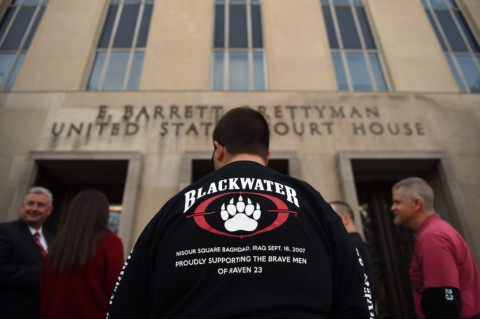
The sentencing of four former Blackwater security guards to lengthy jail terms for the 2007 fatal shooting of 14 civilians in Baghdad grabbed much of the global media discourse last week, with many news agencies interpreting the verdict as a sign of closure on one of the darkest chapters in US history.
“For years, it seemed inconceivable to Iraqis that the American justice system would ever punish the private security contractors who wantonly opened fire in a busy Baghdad traffic circle in September 2007,” said the New York Times. “Yet, on Monday, a judge in Washington imposed lengthy sentences on four former employees of the notorious security firm then known as Blackwater,” the newspaper noted in an editorial.
“These men, who came to embody the American government’s often heavy-handed and at times careless conduct during the Iraq war, asked for leniency but were defiant in asserting their innocence. Judge Royce Lamberth of Federal District Court sentenced one of the men, Nicholas Slatten, to life in prison. The other three, Paul Slough, Dustin Heard and Evan Liberty, were sentenced to 30 years in prison. Slatten, who was the first to open fire that day, was convicted of murder. His former colleagues were convicted of voluntary manslaughter and of using a machine gun to commit a violent offence,” the newspaper said.
It also applauded the verdict as the deliverance – albeit delayed – of justice to the victims of the mindless shooting, and also “a victory for the Justice Department, which faced a litany of setbacks and challenges over the years as it struggled to make sense of the events of that day and gather evidence that could be admissible in court”. It observed that the “abusive conduct of many Blackwater guards, and the sense that Washington condoned it, fuelled the notion that Americans regarded Iraqis as dispensable”. It also noted that “the legacy of the US’ war in Iraq will be forever tarnished by the haunting images of torture at Abu Ghraib prison that emerged in 2003 and the massacre of civilians in Haditha by American Marines in 2005. By bringing some of the Blackwater gunmen to justice, the American government has taken an important, if belated, step toward making amends.”
The Boston Globe focused on the issues of justice and accountability, and said: “The evident overreliance on private companies by the US military for security, intelligence, and logistical support is one of the dark legacies of the Iraq war – and has raised important questions about the accountability of contractors hired to help US forces in combat zones. That concern was thrown into stark relief on September 16, 2007, when employees of the private security firm Blackwater murdered 14 Iraqi civilians and wounded 18. But the sentencing … sent a clear message — that America doesn’t protect war criminals, even when the criminals in question are Americans.”
According to the Globe, “the Iraqi government was sceptical when Washington decided to try the Blackwater guards in America. The lengthy investigation and trial process, which became bogged down in internal Justice Department politics, didn’t do much to instil confidence in the system”. However, the newspaper said in the editorial, the apparently tough sentences handed out to the four guards “sent a strong message that the Iraqis could trust the American justice system”.
It also scrutinised important legal questions, such as whether contractors hired by the US government can be tried under US criminal law while serving overseas, and commented: “Their convictions will probably be appealed for that reason. But the sentences should signal to both the US military and the private companies it hires that those serving the United States must hold themselves to a high standard – and that regardless of where they are, they are not above the law.”
Echoing a similar stance, the Los Angeles Times said: “In imposing lengthy prison terms on four former employees of the security firm once known as Blackwater, a federal judge has reinforced the message that the American legal system can mete out justice even when crimes are committed in wartime in another country.” The newspaper said in an editorial the fact that the defendants were in Iraq when they killed more than a dozen unarmed civilians “shouldn’t have immunised them from prosecution, conviction or punishment, and in the end, it did not”. It also praised the US Justice Department, which it said “deserves credit for doggedly pursuing this case,” and noted: “Considerable attention has been paid to the fact that the outcry over these killings complicated relations between the United States and the government of Iraq. But it was important to seek justice for these victims not simply to defuse a diplomatic crisis but also for the reason any prosecution for murder or manslaughter is brought: to punish those who unlawfully take the lives of others. These killings were horrific. That they took place in a supposed “fog of war” was not an excuse. That is a timely lesson as the US engages anew in Iraq.”





_resources1_16a31069e4e_small.jpg)



